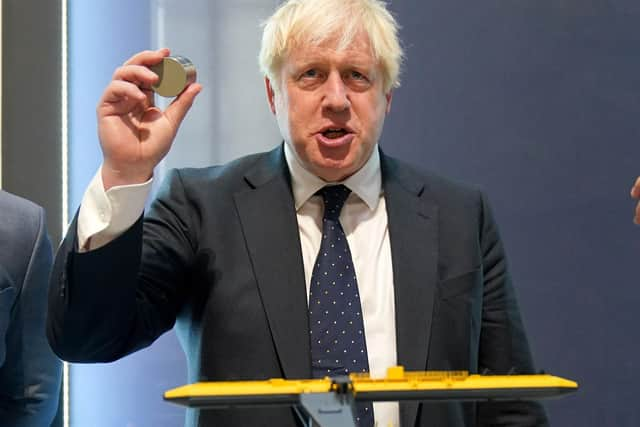‘Green is good’ is a mantra for these troubled times - Greg Wright
When Boris Johnson told an audience of the world’s top executives, that “green is good”, he was underlining the apparent chasm between the gung-ho values of the corporate world of the 1980s and the more fretful environmental preoccupations of the 2020s.
Mr Johnson announced nearly £10bn of private investment in green projects and set out to woo the “trillions of the markets” to help create jobs and fight climate change.
Advertisement
Hide AdAdvertisement
Hide AdThe Prime Minister said the “green industrial revolution”, the freedom to deviate from European Union regulations after Brexit and the “levelling-up” agenda were three reasons why firms should invest in the UK.


Although welcome, this announcement cannot mask the scale of the challenges ahead.
The United Nations has warned that countries are planning production of oil, coal and gas over the next decade at levels that are “dangerously” out of line with targets to curb climate change.
A report by the UN Environment Programme (Unep) and research institutions found that planned production by fossil fuel-producing countries, including the UK, is 110 per cent above the levels that will allow the world to curb temperature rises to 1.5C.
Advertisement
Hide AdAdvertisement
Hide AdDespite increased climate action and pledges, the fossil fuel production ‘gap’ between countries’ plans and what scientists say is needed to curb dangerous levels of global warming has hardly changed since a first report on the issue by the UN in 2019.
The warning comes days before world leaders meet for crucial UN climate talks in Glasgow, where pressure will grow on leaders to take actions to keep the 1.5C limit within reach.
Scientists have warned that the world faces more heatwaves, rainstorms, droughts, greater economic losses and lower crop yields and higher sea levels unless decisive action is taken.
At previous UN talks in Paris in 2015, countries agreed to limit global warming to “well below” 2C above pre-industrial levels and to pursue efforts to curb temperature rises to 1.5C.
Advertisement
Hide AdAdvertisement
Hide AdTo do that, greenhouse gas emissions – which largely come from fossil fuels – must fall rapidly within the decade up to 2030, and continue to fall towards zero by the middle of the century.
But the UN report warns that governments’ production plans and projections would lead to about 240 per cent more coal, 57 per cent more oil, and 71 per cent more gas in 2030 than would be consistent with limiting global warming to 1.5C.
It also warns that planned global production will be 45 per cent more in 2030 than what is consistent with limiting warming to 2C. And it found that, over the next two decades, governments expect an increase in global oil and gas production and only a modest fall in coal production.
Plans and projections see total global fossil fuel production increasing until at least 2040, creating a widening gap between what is being done and the action needed to halt climate change.
Advertisement
Hide AdAdvertisement
Hide AdBut hope is not lost and Yorkshire can lead the charge towards a greener future. Thousands of green jobs are expected to be created in our region after the Government approved a carbon capture and storage project.
The East Coast Cluster (ECC) will be vital for supporting low-carbon industry and power projects across the region. The ECC was named as a ‘Track-1’ cluster by Energy Minister Greg Hands, putting it on course for deployment by the mid-2020s.
The project aims to create and support an average of 25,000 jobs per year between 2023 and 2050, with approximately 41,000 jobs at the project’s peak in 2026.
A new generation of workers is emerging whose lives have been overshadowed by the climate emergency, in the same way the mushroom clouds of nuclear apocalypse haunted the imaginations of children of the 1980s.
Advertisement
Hide AdAdvertisement
Hide AdThe Prime Minister was simply expressing a truism when he addressed the global financiers. Gekko’s world of consequence-free excess has gone.
It makes business and environmental sense for private investors to support low-carbon projects which chime with the spirit of the age.
Support The Yorkshire Post and become a subscriber today. Your subscription will help us to continue to bring quality news to the people of Yorkshire. In return, you'll see fewer ads on site, get free access to our app and receive exclusive members-only offers. Click here to subscribe.